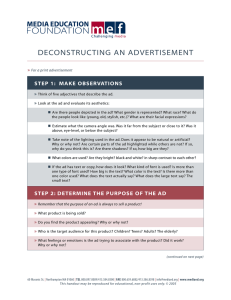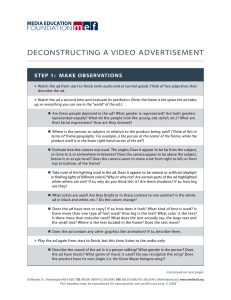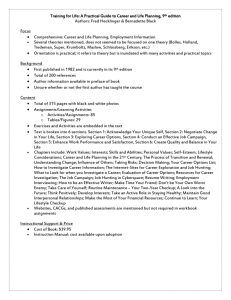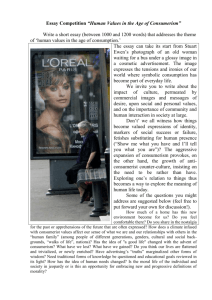Shop 'Til You Drop - Study Guide
advertisement
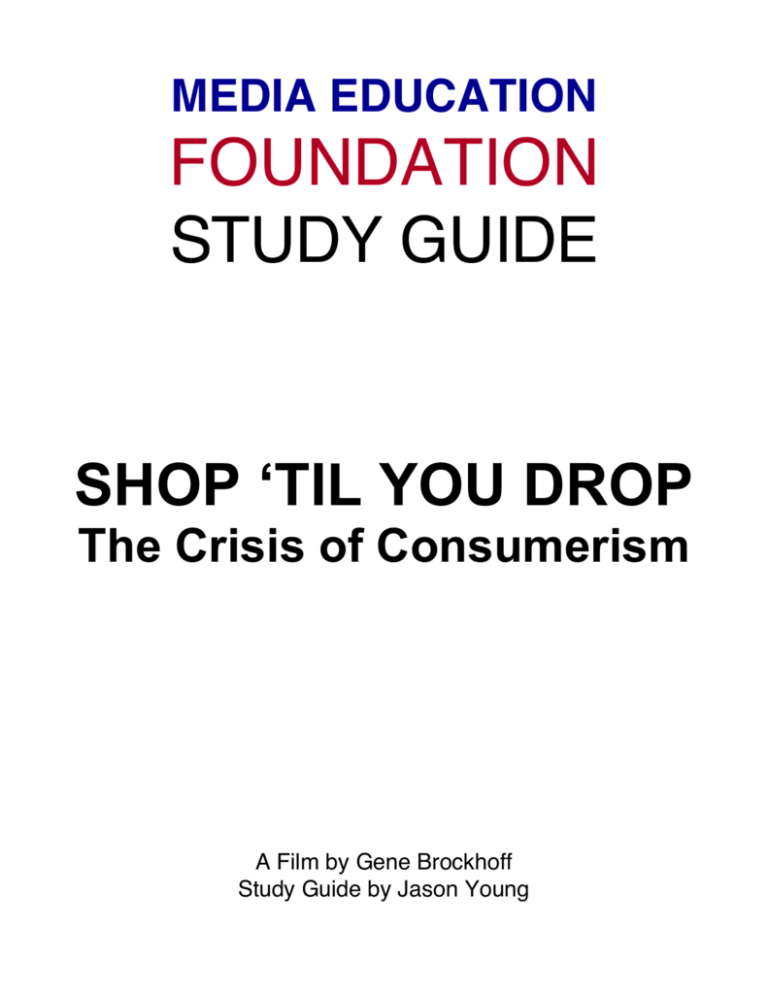
MEDIA EDUCATION FOUNDATION STUDY GUIDE SHOP ‘TIL YOU DROP The Crisis of Consumerism A Film by Gene Brockhoff Study Guide by Jason Young 2 CONTENTS Note to Educators 3 Program Overview 3 Pre-viewing Questions for Discussion & Writing 4 Key Points 4 Post-viewing Questions for Discussion & Writing 6 Assignments 6 © The Media Education Foundation | www.mediaed.org 3 NOTE TO EDUCATORS This study guide is designed to help you and your students engage and manage the information presented in this video. Given that it can be difficult to teach visual content – and difficult for students to recall detailed information from videos after viewing them – the intention here is to give you a tool to help your students slow down and deepen their thinking about the specific issues this video addresses. With this in mind, we’ve structured the guide to help you stay close to the video’s main line of argument as it unfolds: Key Points provide a concise and comprehensive summary of the video. They are designed to make it easier for you and your students to recall the details of the video during class discussions, and as a reference point for students as they work on assignments. Questions for Discussion & Writing encourage students to reflect critically on the video during class discussions and guide their written reactions before and after these discussions. These questions can therefore be used in different ways: as guideposts for class discussion, as a framework for smaller group discussion and presentations, or as self-standing, in-class writing assignments (i.e. as prompts for “freewriting” or in-class reaction papers in which students are asked to write spontaneously and informally while the video is fresh in their mind). Assignments encourage students to engage the video in more depth – by conducting research, working on individual and group projects, putting together presentations, and composing formal essays. These assignments are designed to challenge students to show command of the material presented in the video, to think critically and independently about this material from a number of different perspectives, and to develop and defend their own point of view on the issues at stake. PROGRAM OVERVIEW Are we too materialistic? Are we trashing the planet in our pursuit of things? And what's the source of our desire to buy so much stuff anyway? Shop 'Til You Drop surveys the ecological and psychological terrain of American consumer culture and challenges us to confront these questions head-on. Taking dead aim at the high-octane pace of fast-lane materialism, the film moves beneath the seductive surface of the commercial world to show how the flip side of accumulation is depletion -- the slow, steady erosion of both natural resources and basic human values. In the end, it forces us to consider the limits of consumerism, economic growth, and the American Dream. © The Media Education Foundation | www.mediaed.org 4 PRE-VIEWING QUESTIONS FOR DISCUSSION & WRITING 1. What is America’s economic system? How does it function? How does shopping factor into it? What economic role do you play in this system? 2. Do you think you are susceptible to advertising? Why or why not? 3. Make a list of all the products you own. Why do you think you own the particular products and brands that you do? Is this simply random? 4. Do you think Americans are too materialistic? Why or why not? Do you think there’s a line between simply enjoying certain things and being materialistic? 5. How does buying a new product – or replacing an older one – make you feel? Do you feel the same way at the time of the purchase as you do a few months later? If not, what do you make of this difference? 6. How would you describe what has come to be known as “the American way of life”? How about the American Dream? Do you think these are economically and ecologically sustainable? Why or why not? KEY POINTS • The United States was once an industrial society where citizens were defined by the work they did. Today, the U.S. is a consumer society in where citizens are defined by what they own. • Americans often associate their own happiness with buying things. • The Industrial Revolution transformed the nature of work – from the craftsmanship of the individual to the mass production of the factory. • Increased production led to increased goods, which in turn led to increased consumption. • Thorsten Veblen was among the first home-grown critics of American capitalism. He examined how consumerism and “conspicuous consumption” were re-shaping American identity, and the very nature of the “self,” in his 1899 book The Theory of the Leisure Class. • After World War II, as consumer goods became cheaper and cheaper, more and more working class people were allowed into the middle class lifestyle. They could now afford to buy homes, Chevrolets, refrigerators, washing machines, televisions, etc. • In the 1970s, women entered the workforce. This increase in disposable income gave people of all economic distributions the desire, and ability, to achieve the so-called “affluent lifestyle.” • Advertising is a form of propaganda that appeals to our consumer desires by targeting our human needs – and, in the process, teaches us who we are and what’s important. • Youth marketers spend 20 times more money today targeting children than in 1980. • The average person sees about 25,000 television commercials per year. Commercials are not simply pitches for products; they’re also pitches for a set of values and attitudes toward life. © The Media Education Foundation | www.mediaed.org • 5 Human beings respond emotionally to stories so it’s important for marketers to tie their products to compelling stories. • Since the economic system of capitalism is constantly moving, our personal relationship with products is always changing. This can lead us to buy newer versions of products that don’t need replacing. • The rise of consumer society raises serious concerns about the decline of democratic participation and active citizenship. • There is a rising level of anxiety in the U.S. because people are continuously competing and worrying that someone else will get ahead of them. • People who cannot typically afford the affluent lifestyle are borrowing more money from credit card companies, working more hours, and running down their savings accounts. • Financial anxiety often leads to other stress-related diseases like depression, hypertension, and cardiovascular disease. • Human beings survive as a species mainly because we take care of each another. But this is not encouraged in a consumer society. Consumption breeds individualism. • The cheap energy that modern industrial societies have been relying on for more than a century may not be able to keep pace with the sheer force of economic growth. • Having access to an abundant oil supply has transformed the way we do food. It’s also provided us with the materials to produce an enormous number of products. • In terms of resources, people on the Earth now consume about 1.2 Earths. If everyone consumed as much as the typical American, it would take five Earths to sustain the world’s appetites. • Many Americans are unable or unwilling to recognize that we’re actually undoing the ecological foundations on which our future depends. • About 25% of all plant and animal species on the Earth are threatened with extinction. • According to scientists, the Earth has been through five world extinctions – from being hit by asteroids to volcanic explosions. We are now in the first major extinction caused by one of the species. • What we are doing to maintain our lifestyles in the U.S. has repercussions in other parts of the world. Our exploitation of global resources creates the potential for violent conflict and backlash. • We need to look at ourselves – and to the food we eat, the clothes we wear, the cars we drive, the home we live in, the work we do, etc. – and make choices that will collectively move us toward a more sustainable, compassionate, and wonderful future. © The Media Education Foundation | www.mediaed.org 6 POST-VIEWING QUESTIONS FOR DISCUSSION & WRITING 1. How has American society changed since the Industrial Revolution? How have Americans’ relationships to products changed? Do you think “conspicuous consumption” has become a way of defining “self”? Why or why not? 2. What are your thoughts on modern advertising? How have marketing tactics changed over time? What kind of impact do you think these changes have had on how Americans view products? Do you think marketers should be allowed to target children? Why or why not? 3. In what specific ways do you think the rise of consumer society has affected democratic participation and citizenship in the United States? 4. Do you believe the “affluent lifestyle” can drive people to sickness? Why or why not? 5. How can we, as a country, do to reverse the inconvenient truth that global economic growth is depleting the world’s natural resources? What can you do personally? Explain. ASSIGNMENTS 1. Download Thorsten Veblen’s book The Theory of the Leisure Class, available here: http://www.mediaed.org/Handouts/TheoryOfTheLeisureClass.pdf. Read the introduction, and one other chapter. Write a paper summarizing Veblen’s main ideas, then relate these ideas to the video’s analysis of American capitalism. 2. Find examples of the “affluent lifestyle” on television. Write detailed accounts of each example, and be prepared to share your findings with the class. 3. Over the course of one week, keep an advertising journal in which you record your observations about every television commercial you watch. After a brief synopsis of the commercial, describe the messages, values, and attitudes you think the commercial endorses. 4. Over the course of one week, watch television shows and movies aimed at young children and “tweens.” Write up lists of the messages, values, and attitudes you think each program endorses. Click this link to download a Saturday Night Live skit featuring Miley Cyrus that satirizes the Disney Channel: http://mefwordpress.s3.amazonaws.com/DisneyChannelActingSchool.zip 5. Write a research paper on the history of oil and its importance to the United States. For information on the future of what Michael Klare, defense correspondent of The Nation magazine, calls “Tough Oil,” listen to him on the following National Public Radio show: http://mefwordpress.s3.amazonaws.com/MichaelKlare_ToughOil.zip 6. Research the five previous world extinctions. Compare and contrast how these extinctions came about, and discuss your findings in relation to this quote by Eli Jaxon-Bear: “We are now in the first major extinction that was caused by one of the species…. We’ve caused it.” 7. Option 1: Visit http://www.chrisjordan.com and write a paper about what you think Chris Jordan’s art says about the phenomenon of American consumerism. Option 2: Use Chris Jordan’s art as an inspiration to create your own art critiquing American consumerism. 8. Visit http://myfootprint.org and take the ecological footprint quiz. Then write a paper summarizing how you did and what you learned, and analyzing how you could reduce your impact on the Earth. © The Media Education Foundation | www.mediaed.org
